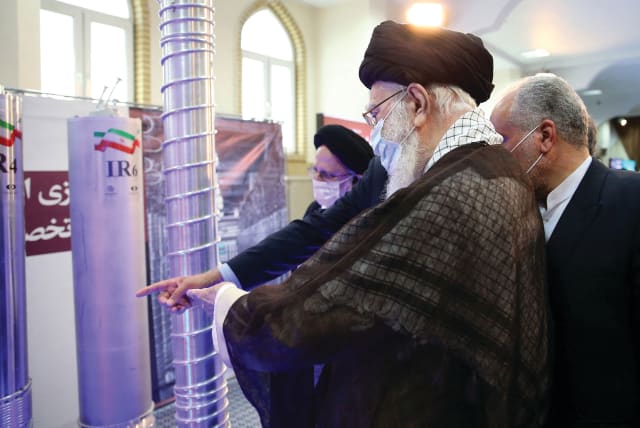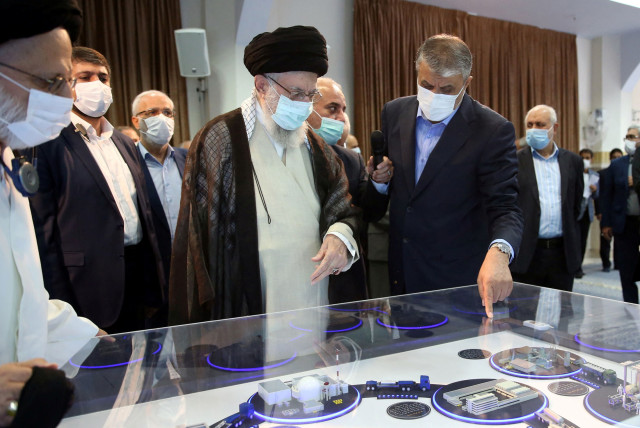What if Iran were nuclear? - opinion

It is reasonable to expect that the potential emergence of Iran as a nuclear power will lead to an emboldened position, in a region that is already full of flashpoints.
With the extreme pace of events following the October 7 genocidal attack by Hamas against Israel, the issue of Iran’s rapidly advancing nuclear program seems to have fallen by the wayside of public attention. But as consideration of the “day after” seems to now be underway, and in light of the understanding that the current crisis is surely not the last Israel will face, it is important to consider the counter-factual scenario of how this all would have played out if Iran had nuclear capabilities on October 7.
Of course, the first question that springs to mind is that of potential nuclear escalation and the risk of nuclear weapons being utilized. However, while this is no doubt a grave concern, we must also consider what Iranian possession of nuclear capability would mean regarding conventional war.
The interaction between the nuclear and conventional levels of conflict has long intrigued international relations scholars. This has led to rich analytical debates about theories, such as the “stability-instability paradox,” which considers that stable nuclear deterrence might lead to a destabilization at the lower conventional and sub-conventional (terrorism for example) levels of war and increase the number of conflicts.
Theories aside, however, history has shown the first 15 years of the US-Soviet nuclear relationship were fraught with crises, from the Korean War, through various other proxy wars, to the Cuban missile crisis. The India-Pakistan relationship had its own incidents, from the Kargil conflict of 1999 (set off by Pakistan that emerged as a nuclear state in 1998), to the Mumbai terrorist attack in 2008, and the Pulwama attack in 2019.
It seems fair to state that emerging nuclear states, especially in a context where they are conventionally inferior to their rivals, are tempted, at least in the early stages of their nuclear life, to act more boldly, relying on their newfound nuclear capacity to balance out conventional inferiority.
Reasonable to expect that a bomb will embolden Iran
IN LIGHT of this, it is reasonable to expect that the potential emergence of Iran as a nuclear power will lead to an emboldened position, in a region that is already full of flashpoints, many of them resulting directly from Iranian influence and intervention.
The war between Israel and Hamas, which erupted as a result of the atrocities of October 7, quickly developed into a multi-arena conflict. Whether Iran and Hezbollah were aware of the scope and timing of the Hamas attack is unclear, but Iran’s support for its proxy, Hamas, is evident and it is quite intent on protecting what it perceives as a major regional asset.
However, in the face of the strong and sustained Israeli military response, coupled with staunch support from the US in both word and deed, Iran’s activation of its other proxies Hezbollah, the Houthi rebels, and militias in Iraq has not resulted in providing effective protection for Hamas.
Now, imagine that Iran had but a minimal military nuclear capability on October 7. Faced with the images of the advancing IDF forces in the Gaza Strip and the firm Israeli response to attacks by Hezbollah, would Iran not then turn to nuclear brinkmanship? Would Israel then still adamantly pursue what its national interest absolutely dictates; the dramatic degradation of Hamas’s infrastructure and capacity to govern the Gaza strip through an aggressive military campaign?
In the northern arena, Hezbollah is currently being deterred from using its large arsenal of rockets and missiles by the images from Gaza, Lebanese public sentiment, and the presence of substantial US forces close by – and Israel has been measured in its response. But if Iran were able to extend any kind of nuclear umbrella to Hezbollah in Lebanon, Nasrallah’s role in the conflict would be far more active and detrimental to Israel, who would then be facing the materialization of Iran’s vision of war on at least two fronts.
AS THINGS stand today, the missile attacks of the Houthi rebels on Israel, US forces, and various marine vessels in the Strait of Bab al Mandab have gone largely unanswered except for interceptions and a limited response to attacks on US forces in Iraq. This is probably due to the US goals of avoiding a wide regional conflict, preserving the unstable ceasefire between Saudi Arabia and Yemen, and evading direct conflict with Iran, a rival who seems to be a stone’s-throw away from crossing the nuclear threshold.
While these US goals are most reasonable and will allow Israel to focus on the tasks at hand – ridding Gaza of Hamas, and pushing back Hezbollah – it must be noted that if Iran is able to employ as an effective deterrent its nuclear threshold state, this does not bode well for what might happen once it has crossed this threshold.
For many years, Iran has employed its proxies in the Middle East with impunity, never paying the price itself for the various hostile actions it is responsible for. Now, with it getting closer and closer to crossing the nuclear threshold as demonstrated by the latest report by the IAEA – with UN sanctions on its missile program having lapsed months ago, and in light of the current conflict, one thing is very clear – Iran cannot be allowed to cross the nuclear threshold.
This is not only because of the risk it would actually use them, which may cause a nuclear arms race in the Middle East but also because of what it would do in the region with a nuclear capability. By no means is this news, but time is running out to prevent this horrific scenario and to ensure that October 7 never happens again.
The writer is a former director for US-Israel relations at the Israel National Security Council, former director of the Council for Peace and Security, and a founding member of the Devorah Forum.
Jerusalem Post Store
`; document.getElementById("linkPremium").innerHTML = cont; var divWithLink = document.getElementById("premium-link"); if (divWithLink !== null && divWithLink !== 'undefined') { divWithLink.style.border = "solid 1px #cb0f3e"; divWithLink.style.textAlign = "center"; divWithLink.style.marginBottom = "15px"; divWithLink.style.marginTop = "15px"; divWithLink.style.width = "100%"; divWithLink.style.backgroundColor = "#122952"; divWithLink.style.color = "#ffffff"; divWithLink.style.lineHeight = "1.5"; } } (function (v, i) { });

